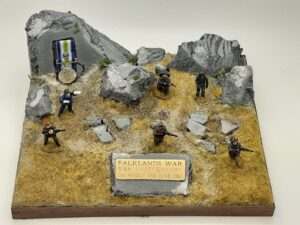Links Combined Forces Project (VPPP Wales)
The innovative and collaborative Veterans’ Places, People and Pathways programme (VPPP) aims to give Veterans safe places in their local area where they can access help and treatment that supports their mental health needs. Ten portfolio projects throughout the UK received a share of almost £8 million, with around 88 individual funded organisations and projects delivering work within those portfolios to achieve the programme aims – many of whom are working across multiple regions.
VPPP Wales shared the following case study which demonstrates the impact of the work they have doing as part of their portfolio.
Veteran X has been coming to Links for several years now but had not been in for a couple of months. He kept in touch by phone calls. He is always encouraged to come in by staff, even just for a coffee and a catch up.

Veteran X started to engage more this year, but staff noticed a change in his conversation, repeating stories, mumbling, forgetfulness. This was monitored and staff would sit and have a chat with him whenever he came in, but as he attended sporadically this was hard to take note of. A face-to-face referral was made to the Help for Heroes clinical nurse with the Veteran’s permission for them to re-engage. Then in February, he came into Links in quite some distress. The Veteran project coordinator sat with him and listened as he broke down explaining he was having increased
flashbacks, his PTSD was at an all-time high, he was constantly thinking of those in his regiment that were lost in the Falklands/Northern Ireland when he served there during the conflicts, and how he was having relationship problems and he couldn’t sleep, waking up hiding under the bedroom window.
The staff member reassured the Veteran, allowed him to talk and gave the options that were available to support the Veteran to get professional help. He did not want to go to A&E or the GP but was willing to speak to Combat Stress or Veterans NHS with the support of the project coordinator.
The phone call to both was made, and Combat Stress took on the referral and would
contact the Veteran within a couple of days for an appointment.
The Veteran went home and was encouraged by the project coordinator to talk to his family and explain how he was feeling. Two days later he came back to Links saying he had spoken to his family and all the support organisations and felt that a huge weight had been lifted. He explained that he was constantly forgetting that he had appointments and support already in place and then getting confused about what was going on and getting into a panic. It was discussed with the Veteran if there should be a plan in place that Links staff could follow on these panic days, and the Veteran agreed this would be a good idea. He thanks Links staff, explaining that Links was “his safe place” and that he would engage more as he knew there was staff here to talk to.
Veteran X continues to be supported by Links – he began coming in most days and sitting in sessions and socialising. A change in his mood has been seen but he is fully supported now. The support network around him is strong and has been very successful in reducing his poor mental health. He appears happier and less stressed, and if he calls or comes in and is in distress, there are plans in place to support him.